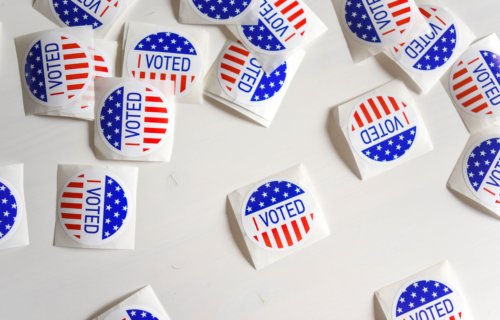BOSTON — If the 2020 presidential election and this year’s midterms stressed you out in a major way, you’re not alone. New research focusing on 2020 has concluded that major political and societal events like elections can have a big impact on psychological health and emotional well-being. The poignant findings paint a picture of a sleepless nation in the run up to, and immediately after, the days the country heads to the polls.
It isn’t much of a leap to assume that big events like a national election can be stressful for citizens. Surprisingly, however, this work represents some of the first research exploring this relationship. Scientists at Beth Israel Deaconess Medical Center (BIDMC) explain that major sociopolitical events can have global impacts on sleep. Those sleepless nights then lead to significant fluctuations in the public’s collective mood, well-being, and alcohol consumption.
All in all, the study strongly suggests divisive political events have a far-reaching negative influence on public mood in a variety of ways.
“It is unlikely that these findings will come as shock to many given the political turbulence of the last several years,” says corresponding study author Tony Cunningham, PhD, director of the Center for Sleep and Cognition at BIDMC, in a media release. “Our results likely mirror many of our own experiences surrounding highly stressful events, and we felt this was an opportunity to scientifically validate these assumptions.”
Does U.S. election stress impact non-Americans the same way?
Conducted as part of a larger study exploring the sleep-related and psychological impact of the COVID-19 pandemic, researchers surveyed 437 Americans and 106 international participants on a daily basis between Oct. 1 and Oct. 13, 2020 (before the election) and then from Oct. 30 to Nov. 12, 2020 (the days surrounding the Nov. 3 U.S. election). Each person reported on their sleep quality, sleep duration, alcohol consumption, and how stressed they were feeling.
Responses strongly suggest Americans were sleeping less, feeling much more stressed, experiencing a more negative mood in general, and drinking more alcohol in the days surrounding the election. Among non-Americans these trends were far less pronounced. Worsening health habits displayed a significant correlation with mood and stress among only Americans.
Surveys took place on a daily basis at 8 a.m. local time and were quite thorough. Participants had to keep track of and assess each previous night’s sleep by recording their bedtimes, time they needed to fall asleep, any awakenings during the night, morning wake time, and any daytime naps. They tracked alcohol consumption as well, and measured mood using a validated questionnaire and questions from a standard depression screening tool.
Both Americans and non-Americans reported less sleep in the days leading up to the election. However, U.S. residents displayed significantly less time in bed in the days around the election. On election night specifically, Americans reported waking up numerous times during the night and experiencing poorer sleep efficiency.
When do voters start drinking more?
Meanwhile, Americans who drank saw their alcohol consumption jump considerably on three days during the assessment period: Halloween, Election Day, and on Nov. 7 — the day most media outlets called the election. The team did not note any changes in drinking habits among non-Americans.
Not all that surprisingly, when the research team analyzed how these behavioral changes may influence mood and well-being, they noted significant links between sleep and drinking, stress, negative mood, and depression.
Regarding anxiety, stress levels were actually largely consistent among both U.S. and non-U.S. participants in early October before a sharp rise in stress for both groups in the immediate days before the election. Stress levels declined once the election was officially called. While that general pattern remained steady among both Americans and those with non-U.S. residence, changes in stress levels were significantly greater in U.S. participants.
‘Sleep may influence civic engagement’
A similar depression pattern also emerged among Americans as well, but non-U.S. participants reported notable declines in negative mood and depression the day after the media called the election.
“This is the first study to find that there is a relationship between the previously reported changes in Election Day public mood and sleep the night of the election,” Dr. Cunningham explains. “Moreover, it is not just that elections may influence sleep, but evidence suggests that sleep may influence civic engagement and participation in elections as well. Thus, if the relationship between sleep and elections is also bidirectional, it will be important for future research to determine how public mood and stress effects on sleep leading up to an election may effect or even alter its outcome.”
Study authors stress that further research is necessary, featuring a more representative and diverse sample to confirm the effect of political stress on public mood and sleep for the general public.
“The 2020 election took place during the height of the COVID-19 pandemic,” Dr. Cunningham concludes. “Despite the chronic stress experienced during that time, the acute stress of the election still had clear impacts on mood and sleep. As such, research exploring the impact of the pandemic should also consider other overlapping, acute stressors that may exert their own influence to avoid inappropriately attributing effects to the pandemic.”
The study is published in the journal Sleep Health.

